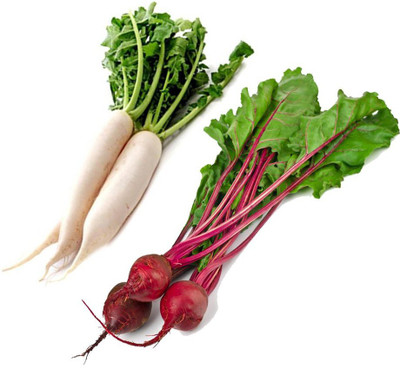VibeX Ōäó XL-630-10 Beet & 10 Radish Seeds Kitchen Terrace Gardening Packet-900 x Seeds Seed(900 per packet)
Quick Overview
Product Price Comparison
Beetroot consists of the phytonutrient betalain responsible for making it an antioxidant, anti-inflammatory, and detoxifying in nature. And it is the plant pigment, betacyanin, responsible for the rich purplish-red tone. The presence of this pigment is what helps prevent the formation of some kinds of cancer cells in the body and prevents birth defects too. Consuming beetroot, better known as Chukandar in India, is very beneficial for the liver and the quickest way to recover from iron deficiency. While detoxifying, beetroot also helps keep the disorders of the liver at bay. Being rich in fibre, beetroot stimulates better bowel functions and stimulates an increase in the antioxidant enzymes. It also comprises glutamine, an essential amino acid that keeps the intestinal tract in good shape. Having a shot of beet juice daily has a positive effect on blood pressure levels too.Mostly, beetroot is eaten raw in salads but it can also be mixed in juices and smoothies or even cooked and pickled.GROWING GUIDE FOR BEET ROOT SEEDSPLANTING INSTRUCTIONSIn zones with low moisture and rainfall, soak the seeds for 24 hours before implanting.When the seedlings are about 2.5cm high, thin out to leave one seedling per 10cm station.Plant seeds ┬Į inch deep and 1-2 inches apart.Ensure that the soil remains moist for germination.GROWING REQUIREMENTSWATERINGMulch and water well. Beets need to maintain plenty of moisture.PESTSGarden pests that attack the crop might cause the following symptoms -small, shiny specks, curled leaves, leaf deformities and a yellowish tint. The pests that might attack the crop maybe - Flea Beetles Leaf Hoppers Mexican Bean BeetleSOILBeetroot likes neutral, moist, fertile soil without too much lime or acidity (pH 6.5-7.0). The soil should be neutral or slightly alkaline.SPOTBeetroot needs a sunny position but it can also thrive in shadeTEMPERATUREIdeal temperature would be between 7┬░C and 25┬░C (44-77 F)HOW TO HARVESTDays to maturity vary between 50 and 70 for most varieties, although they can be harvested at any time you see fit. If you like larger bulbs, wait longer,although they will be tough and woody.Do not let greens grow above 6 inches before harvesting.Nipping off the tops of beets will keep them fresher for longer. Leave about one inch of stem on each beat, and store the greens separately.Beets can be frozen, canned and pickled.


